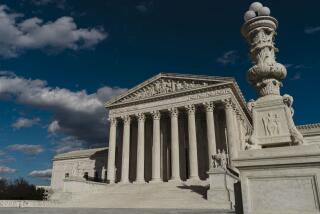Miranda Warning
- Share via
Akhil Reed Amar (Opinion, Dec. 12) suggests that the Miranda warning be altered to include “your silence in the face of police interrogation can also be used against you.” Therefore, one’s exercise of the constitutional right to not give testimony against oneself is in fact evidence of guilt.
My formal legal training consists of traffic school, yet I realize that any inference placed on the right of silence obliterates that right. In a nation where the police successfully resist oversight that would not even be half of what they do to the public and where prosecutors like Ken Starr run roughshod over anyone who gets in their way, the Constitution is the only defense the public has against a government that is as imperfect as each of us.
ROBERT W. MURRAY
Whittier
*
Amar’s article about Miranda rights, though well-reasoned and almost balanced, should have dealt with the following points. 1) Would he contend that everyone would be adequately educated about his rights from viewing TV crime fiction if there had never been a Miranda decision? 2) Why stop at halfway measures, to wit, encouragement of videotaping of interrogations; why not require such taping? Even the avoidance of a few beatings would be worth it. 3) Short of repealing the 5th Amendment, how would the police not be lying to suspects when telling them “but your silence can also be used against you,” as Amar recommends?
JIM HOOD
Camarillo
More to Read
Sign up for Essential California
The most important California stories and recommendations in your inbox every morning.
You may occasionally receive promotional content from the Los Angeles Times.










